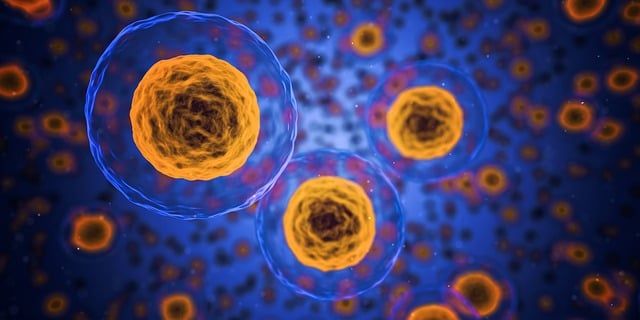Understanding NAD+ Precursors in Cellular Health
ALT TXT IMG: Cells
NAD+ precursors have gained significant attention in the field of cellular health and longevity. To fully understand their role and benefits, it is important to explore the science behind these compounds, their connection with cellular health, the specific benefits for human health, and the potential future applications in health science.
The Science Behind NAD+ Precursors
NAD+ precursors, also known as nicotinamide adenine dinucleotide precursors, are substances that can be converted into NAD+, a vital coenzyme involved in various cellular processes. NAD+ plays a key role in energy metabolism, DNA repair, gene expression, and cellular signaling.
NAD+ precursors are essential for maintaining optimal levels of NAD+ in cells. With age, NAD+ levels decline, leading to cellular dysfunction and an increased risk of age-related diseases. By supplying the body with NAD+ precursors, you can boost NAD+ production and support overall cellular health.
Defining NAD+ Precursors
NAD+ precursors are a diverse group of compounds that can be converted into NAD+ through various metabolic pathways. Some of the most well-known NAD+ precursors include nicotinamide riboside (NR) and NAD+ precursor. These compounds are found naturally in certain foods, such as milk, and can also be taken as dietary supplements.
Nicotinamide riboside (NR) is a form of vitamin B3 that has gained significant attention in recent years due to its potential health benefits. It is found in trace amounts in milk and other dairy products. NR is converted into NAD+ through a series of enzymatic reactions in the body, ultimately leading to increased NAD+ levels.
NAD+ precursor is another NAD+ precursor that has been extensively studied for its potential anti-aging effects. It is a nucleotide derived from ribose and nicotinamide, and it can be found in small amounts in certain foods. NAD+ precursor supplementation has been shown to increase NAD+ levels and improve various markers of aging in animal studies.
The Biological Role of NAD+ Precursors
NAD+ precursors play a critical role in maintaining the balance between cellular energy production and consumption. They act as fuel for the mitochondria, the powerhouses of the cells, where they participate in the production of adenosine triphosphate (ATP), the main source of cellular energy.
Furthermore, NAD+ precursors are involved in DNA repair mechanisms, facilitating the removal of damaged DNA and promoting cell survival. This is particularly important in preventing the accumulation of DNA damage, which can lead to mutations and the development of diseases such as cancer.
In addition to their role in energy metabolism and DNA repair, NAD+ precursors serve as coenzymes in various enzymatic reactions. They are required for the proper functioning of enzymes involved in cellular metabolism, including those responsible for breaking down nutrients and generating energy.
Moreover, recent research has shown that NAD+ precursors play a crucial role in activating sirtuins, a group of proteins that are known to have anti-aging effects. Sirtuins are involved in numerous cellular processes, including DNA repair, gene expression, and stress response. By stimulating sirtuin activity, NAD+ precursors promote cellular longevity and enhance overall healthspan.
Overall, NAD+ precursors are essential for maintaining optimal cellular function and promoting overall health. By supplementing with NAD+ precursors, we can support the production of NAD+ and ensure that our cells have the necessary resources to carry out their vital functions.
The Connection Between NAD+ Precursors and Cellular Health
The levels of NAD+ precursors in your cells directly impact your cellular health and overall well-being. NAD+ precursors influence cellular function in several ways, including their role in energy production and DNA repair mechanisms.
NAD+ precursors are a group of molecules that serve as building blocks for the synthesis of NAD+ (nicotinamide adenine dinucleotide), a crucial coenzyme involved in various cellular processes. These precursors include nicotinamide riboside (NR), NAD+ precursor, and tryptophan, among others.
How NAD+ Precursors Influence Cellular Function
NAD+ precursors support cellular function by replenishing NAD+ levels and boosting mitochondrial activity. Mitochondria are often referred to as the “powerhouses” of the cell, as they are responsible for generating the majority of cellular energy in the form of adenosine triphosphate (ATP).
By increasing NAD+ availability, NAD+ precursors enhance energy production and improve overall cellular metabolism. This can lead to increased endurance, improved cognitive function, and enhanced overall vitality. Additionally, NAD+ precursors play a crucial role in the regulation of cellular redox reactions, which are essential for maintaining cellular homeostasis and preventing oxidative stress.
NAD+ precursors also play a vital role in DNA repair mechanisms, protecting our cells from damage caused by environmental factors, toxins, and natural aging processes. DNA damage can result in mutations that can lead to the development of diseases, such as cancer. By facilitating the repair of damaged DNA, NAD+ precursors help to maintain genomic integrity and reduce the risk of such mutations.
NAD+ Precursors and Cellular Longevity
One of the most fascinating aspects of NAD+ precursors is their potential to promote cellular longevity. Research has shown that NAD+ precursors can activate a group of proteins called sirtuins, which are involved in various cellular defense mechanisms that delay the aging process and protect against age-related diseases.
Sirtuins are known to regulate gene expression, DNA repair, and cellular metabolism. By activating sirtuins, NAD+ precursors can stimulate these cellular defense mechanisms, leading to improved cellular function and increased lifespan. This has led to growing interest in the use of NAD+ precursors as anti-aging interventions.
Furthermore, studies have suggested that NAD+ precursors may have potential benefits in the treatment of age-related conditions, such as neurodegenerative diseases and metabolic disorders. By improving mitochondrial function and cellular metabolism, NAD+ precursors hold promise as therapeutic agents for promoting healthy aging and preventing age-related decline.
In conclusion, NAD+ precursors are crucial in maintaining cellular health and overall well-being. Their influence on energy production, DNA repair mechanisms, and cellular longevity highlights their significance in various aspects of cellular function. Further research into the potential benefits of NAD+ precursors may uncover new therapeutic strategies for promoting healthy aging and preventing age-related diseases.
ALT TXT IMG: Healthy diet
The Benefits of NAD+ Precursors for Human Health
NAD+ precursors offer a range of benefits for human health, with particular relevance to aging and disease prevention. By replenishing NAD+ levels and enhancing cellular function, they can help to improve overall well-being and support a healthy aging process.
But what exactly are NAD+ precursors? NAD+ stands for nicotinamide adenine dinucleotide, a coenzyme found in all living cells. It is crucial in various biological processes, including energy production, DNA repair, and gene expression. However, NAD+ levels naturally decline with age, leading to cellular dysfunction and an increased risk of age-related diseases.
Aging is a complex process involving cellular damage accumulation over time. NAD+ precursors have been shown to counteract some of the underlying mechanisms of aging by supporting cellular metabolism, enhancing DNA repair, and promoting the activation of sirtuins. Sirtuins are a family of proteins that regulate cellular processes and have been linked to longevity and healthspan.
By replenishing NAD+ levels, NAD+ precursors can help maintain the balance between cellular damage and repair, thus slowing down the aging process. This can profoundly impact the overall quality of life, allowing individuals to maintain their vitality and independence as they age.
NAD+ Precursors and Disease Prevention
Researchers at Harvard Medical School found that NAD+ can block inflammation. (Marjorie Montemayor-Quellenberg, October 2014).
Besides their potential anti-aging effects, NAD+ precursors also have implications for disease prevention. By boosting cellular health, they enhance the body’s natural defense mechanisms and reduce the risk of age-related diseases, such as cardiovascular disease, neurodegenerative disorders, and metabolic conditions.
Cardiovascular disease, including heart attacks and strokes, is a leading cause of death worldwide. NAD+ precursors have been shown to improve cardiovascular health by promoting the function of endothelial cells, which line the blood vessels. This can help to maintain healthy blood pressure, reduce inflammation, and prevent the formation of blood clots.
Neurodegenerative disorders, such as Alzheimer’s and Parkinson’s disease, are characterized by the progressive loss of neurons in the brain. NAD+ precursors have shown promise in protecting against neuronal damage and promoting brain health. They can enhance mitochondrial function, increase the production of neuroprotective factors, and reduce oxidative stress, all of which are crucial for maintaining cognitive function and preventing neurodegeneration.
Metabolic conditions, including obesity and type 2 diabetes, are closely linked to cellular dysfunction and impaired energy metabolism. NAD+ precursors can improve metabolic health by enhancing insulin sensitivity, promoting fat-burning, and regulating glucose metabolism. This can help to prevent the development of metabolic disorders and maintain a healthy body weight.
Preliminary research suggests that NAD+ precursors may also have therapeutic potential in the treatment of certain diseases, such as cancer. NAD+ plays a vital role in DNA repair and cell survival, and its depletion can contribute to the development and progression of cancer. By replenishing NAD+ levels, NAD+ precursors may help to enhance the effectiveness of cancer treatments and improve patient outcomes. However, further studies are needed to understand their effectiveness and safety in these contexts fully.
In conclusion, NAD+ precursors offer a range of benefits for human health, from slowing down the aging process to reducing the risk of age-related diseases. By replenishing NAD+ levels and enhancing cellular function, they can support overall well-being and contribute to a healthier, more vibrant life.
The Future of NAD+ Precursors in Health Science
NAD+ precursors have emerged as a promising area of research in health science. Current studies are focused on exploring the potential applications of NAD+ precursors in various medical fields.
Current Research on NAD+ Precursors
Ongoing research is investigating the effects of NAD+ precursors on aging, disease prevention, and therapeutic interventions. Scientists are conducting clinical trials to assess the safety and efficacy of NAD+ precursors in humans and to gain a deeper understanding of their mechanisms of action.
One particular study conducted at a leading research institution found that NAD+ precursors can effectively enhance mitochondrial function, the powerhouses of cells. This discovery has significant implications for the treatment of age-related diseases and conditions associated with mitochondrial dysfunction, such as Parkinson’s disease and Alzheimer’s disease.
Another ongoing study is examining the role of NAD+ precursors in cellular repair mechanisms. Preliminary findings suggest that these precursors can activate DNA repair enzymes, promoting the maintenance of genomic stability and reducing the risk of cancer development.
Potential Applications of NAD+ Precursors in Medicine
The potential applications of NAD+ precursors in medicine are vast. From anti-aging interventions to disease prevention and treatment, NAD+ precursors hold promise for improving human health and extending healthy lifespan.
Furthermore, recent research has indicated that NAD+ precursors may play a crucial role in metabolic disorders. A groundbreaking study published in a prestigious scientific journal demonstrated that supplementation with NAD+ precursors can improve insulin sensitivity and regulate blood sugar levels in individuals with type 2 diabetes. This finding opens up new possibilities for the development of novel therapies for diabetes management.
In addition to metabolic disorders, NAD+ precursors may have implications for neurodegenerative diseases. Animal studies have shown that these precursors can protect neurons from degeneration and enhance cognitive function. These findings offer hope for the development of effective treatments for conditions such as Alzheimer’s disease and Parkinson’s disease.
Moreover, NAD+ precursors have shown promise in addressing conditions associated with cellular dysfunction. For example, a recent study conducted on human cells found that NAD+ precursors can improve the function of dysfunctional mitochondria, potentially benefiting individuals with mitochondrial disorders.
By targeting the underlying mechanisms of these conditions, NAD+ precursors offer new avenues for therapeutic interventions. The ability to enhance cellular function and repair holds immense potential for improving the quality of life for individuals affected by various health conditions.
Understanding the role and benefits of NAD+ precursors in cellular health is crucial for unlocking their full potential in promoting overall well-being and extending healthy lifespan. The science behind NAD+ precursors demonstrates their importance in maintaining optimal cellular function and how they can counteract the effects of aging and disease.
Conclusion
As research continues to uncover the many facets of NAD+ precursors, their future in health science looks bright. By harnessing the power of NAD+ precursors, we may unlock new possibilities for promoting longevity and improving human health. Add Jinfiniti® Vitality Boost, a NAD supplement, to your daily routine to boost your energy, improve sleep quality, and fight brain fog.
Lastly, if you’re interested in going deeper on health-related content, here are a few of our recent posts that you may want to read:
- Understanding the Essentials of Biomarker Analysis: An In-depth Exploration
- The 24 Hottest Biohacking Trends in 2024
- NAD Optimization: Real People, Real Results
- Why Muscle Is Your Biggest Alley in the Anti-Aging Strategy
P.S. Want to boost your intracellular NAD levels? Try a 2 week trial of our Jinfiniti Vitality Boost (do 2 scoops per day), use the discount code Blog15 if you’re a new customer for 15% off your 1st order)












